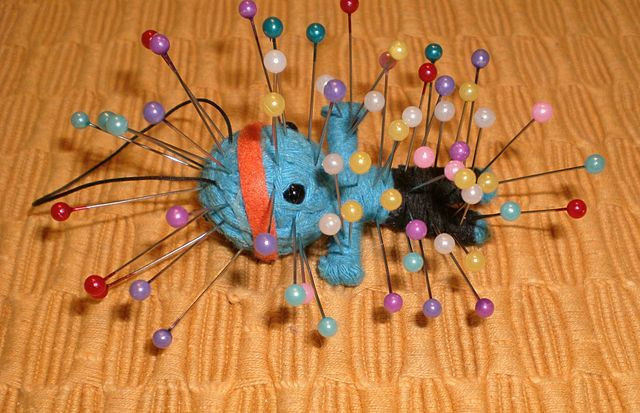Looking For Revenge Soothes Social Rejection, Bad Mood: The Complicated Psychology Of Why Hurt People Hurt People

Most of us have thought of looking for revenge if a professor flunks us; if we get stood up on a date; or if our colleague backstabs us. We often hear "revenge is sweet," and the craving to hurt those who've hurt us sounds satisfying to our wounded egos. Science has found a good reason why. A new study published in the Journal of Personality and Social Psychology suggests seeking vengeance on those who've wronged us triggers a need to boost our mood by whatever means necessary, specifically aggression.
"Retaliatory aggression is often a pleasant experience," wrote the researchers, in the study.
Read More: Why We Use Sex To Lash Out In The Aftermath Of A Breakup
Revenge is a deep instinct many of us have. We often seek it as a way to establish justice, and ensure people do not hurt us in the future. Previous research has found we may seek revenge if we're motivated by power, by authority, and by the desire of status. In other words, it's a coping mechanism we use to diminish our shame, or a self-preservation method.
With this in mind, researchers from the University of Kentucky investigated the ways in which revenge and aggression boost our mood. They found aggression can be a viable method of mood repair, but the relief that anger provides is a wretched consolation.
A total of 156 university students were asked to write an essay from a personal topic of their choice, before they swapped with others to get feedback. One group of participants received nasty feedback (composed by the researchers), such as "one of the worst essays I have EVER read." The researchers measured mood before and after participants were given the chance to express a symbolic form of aggression — sticking pins in a virtual voodoo doll imagined as the person who had given them mean feedback (black magic). This did appear to repair mood for those rejected, to the point where their mood was indistinguishable from participants who received nice feedback.
Now, to investigate motives, David Chester and C. Nathan DeWall recruited 154 students who were given a placebo pill and told it had a specific side effect: Once it kicked in, their mood would become fixed and unchanging (all these claims about the pill were a fiction, it was an inert placebo). The students took part in a computer-based game where they and two other players passed a ball back and forth. Those placed in the "Rejection condition" experienced a cold shoulder from their two playmates, which were pre-programmed computer responses. They received only three of the 30 passes, compared to an equal share of passes in the "Accepted condition."
Participants were asked to rate how rejected they felt, and felt the need to take a chance on revenge. The next game was a simple "first to the buzzer" reaction race, but each round the slower player was always punished by a blast of noise through their headphones. When participants were faster, they could adjust the intensity of the noise suffered by their opponent, up to 105 decibels: the volume of a jackhammer or a helicopter hovering at 100 feet.
Those who'd suffer rejection chose to inflict louder sound blasts on their opponent (who rated them lower). However, those who were given the placebo pill, and were rejected, were unaffected by snubbing. The pill made them believe they had no immediate way of improving their mood, so there would be no point lashing out.
Read More: The Benefits Of Rejection
In the break between games, these participants were alerted that the drug was by now fully active and their mood would stay as it was for an hour. These participants restricted their sound blasts to the lower levels administered by participants who hadn’t suffered earlier rejection.
The participants who administered lower levels were unaffected by the snubbing, because they believed they had no prospect of improving their mood, so there wouldn't be a point in lashing out. However, the avengers felt pleasure over someone else's misfortune, after that person socially rejected them.
The only reason why getting revenge may stroke our ego is to alleviate our bad mood.
The Brain On Revenge
A 2002 study found the thought of revenge leads to an increase in blood flow in a specific brain region that means more oxygen consumption, and more brain activity in this region. The activation of the dorsal striatum reflects some sort of anticipated satisfaction from punishing those who break social norms. The higher the activation, the more people are willing to spend on punishment. Meanwhile, a second area of the brain, known as the prefrontal cortex, is activated when we need to weigh the satisfaction derived from punishment and in this case, against monetary cost of punishment.
The thought of revenge may linger in our minds because we begin to ruminate about what’s troubled us. When we don’t seek revenge, the event continues to haunt us, psychologically. However, if we don’t seek revenge, it convinces us the event wasn’t as significant, so we forgive and forget.
Revenge may look sweet in the short-term, but forgiveness is healthier in the long run.
Source: Chester DS and DeWall CN. Combating the Sting of Rejection With the Pleasure of Revenge: A New Look at How Emotion Shapes Aggression. Journal of Personality and Social Psychology. 2016.
See Also:
‘Revenge Porn' Mogul, Kevin Bollaert, Faces 20 Years In Jail
Assault Victims In Michigan Hospital Agreed ‘Revenge Was A Good Thing’



























